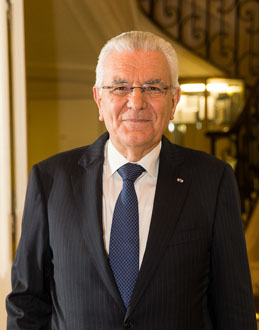The Economic and Social Council (ESC) is a consultative assembly which replaced the former Chambre Consultative du Commerce, de l’Industrie et des Intérêts fonciers et professionnels étrangers. Its main functions are to provide advice on social, financial, tourism, commercial and industrial matters which generally affect the economic life of the country. We met its President, Mr. André Garino.
How is Monaco’s economic and social activity going?
Monaco’s attractiveness, in economic and social terms, is confirmed, with a rise in the number of businesses and over 53,000 employees, a number which is increasing steadily in both the public and private sectors. More than 75% of them are live outside Monaco.
Is the service sector generating jobs?
We are indeed observing growth in wealth management activities and services for new residents.
Does the industrial sector seem to be restructuring?
Despite the restructuration we regularly see, this sector accounts for over one hundred businesses which employ more than 3000 people, with total turnover in excess of one billion euro. It is a dynamic sector that is undergoing transformation. The Administration des Domaines, the owner of industrial property in Monaco, regularly receives setting up applications from industrial companies wishing to develop. In order to respond to this demand, the Monegasque state is planning the construction of a property complex for office and industrial use on Charles III island, close to the Cap d’Ail border, located at the end of a right of way reserved for future “exclusive lane public transport”.
At your last General Meeting you mentioned the improved living environment...
The improved living environment, and the adaptation of industrial and commercial areas to today’s new needs, unquestionably contribute to raising the quality of life, which is itself part of Monaco’s attractiveness. We have drawn the government’s attention to the need to improve urban transport, which could precisely be an obstacle to that same attractiveness. Moreover, in partnership with Monaco Statistics, we have just hosted our counterpart from the Grand Duchy of Luxembourg to consider new criteria to build into GDP and which take into account the quality of life in Monaco.
Can quality of life be measured statistically?
Yes, of course. It is in this perspective that Monaco Statistics organized a meeting for the presentation of the Better Life Index (BLI, an OECD indicator)on 5 February. Our counterparts in the Grand Duchy of Luxembourg considered the option of combining competitiveness and well-being, where competitiveness is defined as “improvement of the standard of living of over the long-term, while respecting the environment.”






